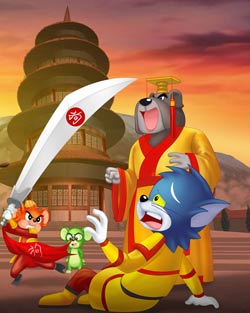借刀杀人
Kill with a Borrowed Sword
原文 Content
敌已明,友示定,引友杀敌,不自出力,以《损》推演。
英文注释:When you do not have the means to attack your enemy directly, then attack using the strength of another. Trick an ally into attacking him, bribe an official to turn traitor, or use the enemy's own strength against him.
探源 Origin

英文:During the Spring and Autumn Period, there were three fearless warriors in Qi by the name of Gongsun Jie, Tian Kaijiang and Gu Yezi. They were very arrogant because of the accomplishments on the battlefield and even showed disrespect towards the king of Qi, Jing Gong. So when Jing Gong planed to remove them to avoid any future troubles, the prime minister, Yan Ying suggested killing the three warriors with two peaches. Two peaches were to be awarded to the two of them who deserved it the most. Gongsun Jie and Tian Kaijiang thought they were deserved and took one peach each, while Gu Yezi angrily pulled his sword and challenged the other two to a duel. At last Gongsun Jie and Tian Kaijing felt ashamed of arguing fiercely just for two peaches and then committed suicide with their swords. Having watched this, Gu Yezi killed himself the same way. Thus Yan Ying was able to remove three potential threats to the country of Qi without lifting a finger.(引用自全球华文网)
中文:春秋时期齐国有三位无敌勇士,名叫公孙接、田开疆、古冶子。他们恃功傲慢,甚至连齐景公都不放在眼里。所以当景公计划除掉他们、以绝后患的时候,齐相晏婴提出了“二桃杀三士”的建议。两只桃子将被赏赐给其中功劳最大的两个人。公孙接、田开疆认为他们的功劳最大就各拿走了一只桃子;而古冶子生气地拔出剑做决斗状。最后公孙接和田开疆为他们因区区两只桃而争得不可开交感到十分羞愧,便挥剑自刎了。目睹这一切后古冶子也用同样的方式自杀了。于是晏婴不费吹灰之力就铲除了齐国的三个隐患。
词汇 Vocabularies
traitor: 叛徒,背叛者
arrogant: 傲慢的,自负的;与proud的区别是arrogant为贬义词,而proud为中性词
duel: 决斗,斗争;challenge sb. to a duel意思是向某人要求决斗
commit suicide: 自杀;类似的说法还有self-murder, kill oneself
without lifting a finger:不费吹灰之力;如:get sth. without lifting a finger(唾手可得),reap the spoils of victory without lifting a finger(坐收渔利)
总结 Summary
砍人肯定是要准备刀的。可如果对方人高马大,而手中只有一把指甲刀,拿着指甲刀去砍人无异于找死。这时就需要借助外力,或挑拨离间或指桑骂槐,假他人之手而除之。如此一来,既不需自己赤膊上阵,又不需消耗自己的实力,更不会招致杀人凶手的罪名,所谓的杀人于无形之中即是如此。
相关阅读
(来源:沪江英语 编辑:崔旭燕)